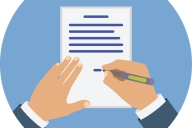You have /5 articles left.
Sign up for a free account or log in.

Getty Images
Job market candidates can spend months preparing written materials such as research statements and teaching philosophies, but invitations to interview usually leave candidates with only weeks or even days to prepare. What are the most important things to do before and during an interview? Here are a few suggestions for job seekers:
- Do your research: Before the interview, learn as much as you can about the department, the faculty, the students, and the institution. What courses does the department offer? What are the research interests of the faculty members you will interview with? What are the cultural, educational, linguistic, and geographical backgrounds of students? What resources, opportunities, or innovative initiatives does the institution have that you would be eager to make use of or become involved in? You probably already did some research to write your cover letter for the position — and, presumably, did a good job of it, since you’ve landed an interview — but now is the time both to refresh your memory and to dig even deeper. Knowing as many specifics as possible will make your answers to questions more successful, and also gives the impression that you want this job, and not just any job.
- Know what to expect: Interview committees can consist of as many as eight people, and it can be overwhelming to walk into a room and find so many unfamiliar faces staring expectantly at you. Try to determine beforehand how large the interviewing committee will be and who will be on it (it’s not unreasonable to ask the committee chair for this information if you can’t find it out on your own). As you interview, continually remind yourself to make eye contact with each committee member, no matter how many there are. You should also be prepared for the possibility that one or more committee members may not be faculty in the department you are interviewing with – representatives from campus diversity committees or affirmative action programs may also be present, and tend to ask different types of questions than department faculty members.
- Prepare answers to possible questions, including follow-up questions: Spend as much time as possible thinking about questions you might be asked and sketching out answers to them. You should also try to anticipate the follow-up questions interviewers might ask in response to your answers. While initial interview questions are fairly easy to predict and prepare for (“tell us about your research”; “describe a successful assignment or practice you use with students”), follow-up questions may be more likely to catch you off-guard.
- Don’t say anything that could be offensive or off-putting to committee members: An example: I teach courses in contemporary multi-ethnic American literature, and when asked in an interview how students respond to these texts, I said, without thinking too carefully, that they find them a lot more relatable than “outdated” writers like Shakespeare — only to find out that one of the interviewers was a Shakespearean scholar. Choosing your words carefully is crucial when interviewing: be sure that you know how to speak with enthusiasm about what you do without being critical, dismissive, or condescending of other research interests and teaching approaches.
- Bring a teaching portfolio: Interviews are the time to break out that portfolio: if the committee is interested enough to meet with you face-to-face, they will likely be interested in seeing your teaching materials as well. A compilation of sample syllabuses and assignments, student evaluations, and faculty observation reports provides a more in-depth and comprehensive look at your pedagogy and practices than can be gleaned from an interview, and also leaves the committee with a set of materials to remember you by.
- Know what to do if you are asked to interview virtually: Using FaceTime, Skype, and other forms of video conferencing to conduct first-round interviews is becoming increasingly common, but virtual interviews require different forms of preparation than face-to-face interviews. For one thing, you need to do all you can beforehand to prevent technical difficulties and practical problems on the day of. Practice by video chatting with a friend or family member prior to the interview, in the same space you will use for the interview itself, and check things like the lighting in the room, the speed and reliability of your internet connection, and the size of your face and volume of your voice from the perspective of the other person. On the day of the interview, do all that you can to ensure the space you are in is free of unwanted noises, distractions, and interruptions — you don’t want the cat to hop on your lap or an alarm to start going off as you are answering a question. During the interview, try your best to address and make eye contact with every committee member, even if you find it difficult to see interviewers’ faces clearly. If you can’t hear what is being asked, be sure to say so rather than hoping that you heard the question correctly.
- Have a few good questions of your own: Almost every interview ends with the committee asking what questions you have. This is another opportunity to prove that you have done your research: find a few department activities or university initiatives that you would be interested in participating in as a faculty member, and ask questions about these. You should also ask at least one or two questions that show you are thinking about long-term plans and goals (especially if you are interviewing for a tenure-track position): inquire about tenure and promotion requirements, funding for research and travel, and opportunities for professional development.
- Be likeable: As impossible as this might seem, try your best to relax and be yourself during the interview. Committee members are looking for a promising scholar and capable teacher, but also for someone they will enjoy working with, and, in the case of tenure-track hires, potentially having around for years to come. Don’t let nerves or anxiety make you seem awkward or robotic — smile, laugh, be friendly, and be relaxed. Give the impression that you are a colleague others will want to collaborate with.








